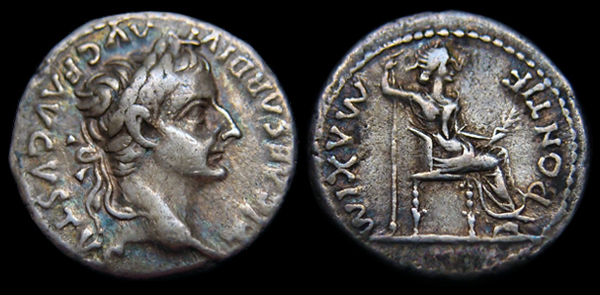Daily Office Readings for July 3, 2020:
AM Psalm 140, 142; PM Psalm 141, 143:1-11(12)
Num. 24:1-13; Rom. 8:12-17; Matt. 22:15-22
Our Gospel reading today is one of those readings where the more you look at it, the deeper it gets, and moves way beyond the traditional way we might have been taught to think about it.
On the surface, it appears that the Pharisees are trying to trap Jesus. “Is it lawful to pay taxes to the emperor, or not?” If Jesus says “Yes”, the crowd, no friends of Rome, will view him as a pawn of the Empire. If Jesus says “No”, then they have the ammunition they need to rat him out to the authorities as an enemy of Rome. It never was about whether they should be paying taxes to Rome or not. It was all they needed to lump him in with the Zealots, who resisted paying the Roman taxes.
Look, though, at what Jesus does. Instead, he traps the Pharisees. He asks to show them the coin used to pay the tax, and someone digs around and hands him a Roman denarius. He then asks them to tell him whose head is on the coin, and they respond it’s the emperor.
Keep in mind that temple taxes are paid in shekels, not denarii–that’s why there were money changers in the temple to begin with, in that great story from John! By now you might be thinking, “Hey, wait a minute, how did the Pharisees come up with a denarius?” When they showed it, it probably looked a lot like the one in the picture at the top of this reflection, with the emperor Tiberius on it. On the obverse, it says an abbreviated version of “Tiberius Caesar, divi Augustus filius Augustus”– Caesar Augustus Tiberius, son of the Divine Augustus. Since the emperor was considered to have the divine right of leadership, well…”The son of God”, in a manner of speaking. On the back would have been Wisdom, and an abbreviated version of “Pontifex Maximus”–literally, “The greatest bridge-builder”, the colloquial term for “The Highest of the High Priests.” The grandest poobah. The highest muckety-muck.
In Jesus’ sidestepping of the question, he exposes the Pharisees’ own hypocrisy–they have a coin that counters their own beliefs 180 degrees and shamelessly put it out there. So Jesus’ answer about rendering what belongs to Caesar to Caesar has precious little to do with one’s duty to pay one’s taxes, and everything about their own duality when asking him such a question. In other words, he trapped the trappers!
Yet…really…isn’t that a little of what we’re all dealing with in these strange times, as we negotiate the thorny path of our national life concurrently with our understanding of eternal life and following Jesus?
Our own prayer book reflects that tension. We have prayers in the prayer book for our national life, and in the U.S,, Independence Day is a feast day on our calendar and has its own collect. Yet even that has a backstory. Our first General Convention in 1785 directed that a service be drawn up for Independence Day, and the Proposed Book of Common Prayer, in 1786, contained a prayer called “A Form of Prayer and Thanksgiving to Almighty God for the inestimable Blessings of Religious and Civil Liberty.” William White, who would become our first Presiding Bishop, was opposed–after all, many of the clergy had been Tories. Although White had sided with the Revolution, when he was ordained, he had been sworn to the king. Consequently, the service was pulled from the 1789 BCP, and it wasn’t until the 1928 BCP that propers for July 4 resurfaced. July 4 wasn’t declared a major feast day until the 1979 BCP.
Jesus asked “Whose head is on the coin?” In a way, it’s a question more like, “Whose image is stamped on us?” He exposed the Pharisees as being more the reflection of Rome, than of God. It calls us to ask ourselves when our involvement in our national life is a reflection of God, and when it’s a reflection of the idol of nationalism as a false god. One look at the news reveals we’re all going round and round trying to figure that one out, and we don’t all agree, any more than the folks who shaped the early years of the Episcopal Church in the United States. At the same time, we’re called to love one another in spite of those disagreements, and share our sacramental life. The protester and the law enforcement officer are called to the same communion rail.
What are the things we are called to willingly and obediently participate in, when it comes to our national life, and what are the things we are called to change in our national life to better honor our Baptismal Covenant? We’re seeing that tension on the ground everywhere we look. It’s painful, yet at the same time, necessary, so that the voices that have been muted can now be heard. The hope, of course, is that all of us will somehow end up better reflecting the image of God rather than the image of a hollow false god wrapped in the symbolism of flags and statues.
Where are the places each of us needs to admit we’re stamped more with the image of the Emperor, rather than the Son of God?
Image: Roman denarius from the reign of Tiberius, courtesy of Wikimedia Commons. This would have one typically seen at the time of Jesus.
Maria Evans splits her week between being a pathologist and laboratory director in Kirksville, MO, and gratefully serving in the Episcopal Diocese of Missouri , as the Interim Pastor at Christ Episcopal Church, Rolla, MO.

